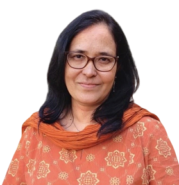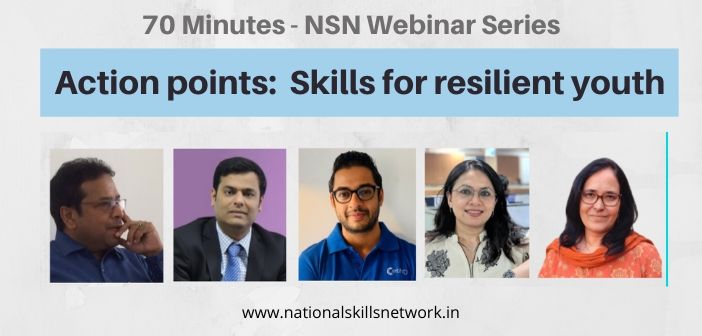On the occasion of World Youth Skills Day 2020, NSN launched a webinar series called “70 minutes” (सत्तर मिनट) on 15th July 2020. The term 70 minutes or Sattar Minute, is inspired from the film Chak De India, where the protagonist Shah Rukh Khan delivers a monologue on the importance of every minute of the (hockey) game, how one should play to their full potential and love every part of the game. Similarly, the team NSN want to focus on some key action points in 70 minutes, that can be implemented by various stakeholders in the domain of skill development and vocational training for making skills aspirational and to improve the delivery system of skills and training.

The first webinar in the series was on “Skills for resilient youth”, based on the theme for this year’s United Nation’s World Youth Skills Day. The eminent panelists for the webinar were Dr. Darlie Koshy, Director General, ATDC; Dr. P. Srinivasa Rao, CEO, ApolloMedSkills; Rakshit Manga, Director (Sales), Certif-ID; and Ms. Neeti Sharma, Senior Vice President, Teamlease. The session was moderated by Dr. Madhuri Dubey, Founder, National Skills Network.
Skills for resilient youth
Speakers in the panel broadly focused on the need for building resilience among youth in both technical and transferable skills (employability skills or soft-skills like agility, creative, communication, etc.), the future of skilling in the view of COVID-19 pandemic and the role of technology in promoting resilience among the youth.
After a brief discussion on the theme, each speaker shared three action points for building resilience among youth. They shared macro-level and micro-level perspective on ideas and initiatives which affect the youth, and all the stakeholders in the domain of education, employment, and employability.
 Dr. Darlie Koshy, Director General, ATDC
Dr. Darlie Koshy, Director General, ATDC

“To become resilient in challenging times, the youth must make their vocation as a vacation. We must focus on 3Es – Education, Engagement, and Employment. Focusing on the 3 Es for youth in terms of skills and knowledge will drive a roadmap for India to build a resilient youth. Youth must utilise these times to find and realise their purpose in life. “
The three action points are:
- Focus on RUN – Reskilling, Upskilling, and New Skilling: With the ongoing migrant crisis due to the sudden outbreak of COVID-19 pandemic, the majority of the migrant workers returned to their homes in various states in India. States have taken innovative steps like skill mapping to identify their skills and to employ them within the state. This step will also help the state authorities to reskill, upskill, or provide new skills to the workforce. Resilience among the youth is built by developing new methods of skill development. There is going to be a phenomenal change in the next coming decade, new methods would be developed, which will prevent migration in the long run.
- Revisiting Qualification Packs (QPs): QPs and National Occupational Standards (NOS) for all the courses must be revisited to understand the skill intensity and theoretical intensity. This must be done in the view of changing nature delivering classes to the students. For example, the course on Pattern Making was completely practical-based, however, with newer technology and tools, anyone can learn it and practice it even with touching the equipment physically.
- Future jobs and skills: All future jobs would need employees who are agile, i.e., anti-fragile. Companies would hire people who are creative, who can communicate effectively, etc. Women must be encouraged to take up new job roles and be part of the workforce. Policy level interventions must take place to address this. Resilience can be built through creativity, confidence, and communication.
Dr. P. Srinivasa Rao, CEO, Apollo MedSkills

“With the outbreak of Coronavirus across the globe, there has been a sudden increase in demand for telehealth operators and telemedicine executives. There is a growing demand not just for doctors but also for other healthcare professionals. Therefore, in the long run, the country would need many medical colleges, training institutes, etc to cater to the demand.
We have seen a great rise in demand in the allied health sector across six skills. Some of the job roles in high demand are Medical lab technicians, Phlebotomy technicians, telemedicine coordinators, geriatric, and home healthcare professionals.”
The three action points are:
- Individual: Students must take this up as an opportunity to introspect about their career. It is the right time to think and introspect about their true aspiration. Students need to learn to be agile.
- Institutes: Skill development institutes must engage their trainers well to build e-content in terms of videos. Trainers must be encouraged to make these videos. Skill development institutes must invest in technology.
- Industry: This is the right time for the industries to encourage and take in internships and apprenticeships. There is a lot of talent out there and that must be utilised by the industry.
He also highlighted 5 critical C’s for building resilience in healthcare skills are Competence, Challenge, Commitment, Connectivity, and Channels.
Rakshit Manga, Director (Sales), Certif-ID

“IndiaSkills has recently come up with 3 Ps – Passion, Patience, and Persistence for success. These are challenging times, but there is also an opportunity. The opportunity is to shift and adapt to technology. The government and TVET institutions are playing an important role to shift the focus to vocational education and training.
If we follow all the Es, all the Cs, and all the Ps, we are making ourselves more employable. Employability comes with life-long learning.”
The three action points are:
- Institutes: It is time institutes adopt blockchain technology while certifying the students. Since this is easily verifiable by the organisations it promotes authenticity and transparency.
- Corporates: Earlier industries or corporates used to approach third-party agencies to do a background verification for the students. However, now the industries can use technology to verify the skills of the students.
- Students: Since students cannot receive a degree in person or physically, institutes can offer them degrees using blockchain technology. Compared to PDF format of certificates, blockchain certificates will have more trust, transparency, and accountability.
Ms. Neeti Sharma, Senior Vice President, Teamlease

“The last four months have been difficult for all the individuals and institutions due to COVID-19. Industries have been disrupted. And all of us have reacted to it differently to cope with it. Students who went back to their homes, and trainers at the institutions, have adopted the technology very quickly and that is something we need to appreciate. This is how resilience is built among the youth. The most important activity to take up now is to map skill sets to job roles.”
The three action points are:
- Skill mapping – Skill mapping of the workforce is very important to understand the skills the workforce has. This will also help in the redeployment of the workforce in new job roles. For example, many employees from the aviation and tourism sector have lost their jobs, however, they can easily get absorbed in any other customer-related jobs. There is also a growing demand for skilled workforce in the sectors of Healthcare, Retail, and Edtech.
- Apprenticeships – Industries must encourage and take in interns and apprentices. Apprentices are not people who do not have any idea about the work, they are people who have 60-70% subject knowledge, therefore, their knowledge and skill can be utilised by the industry. It is time we encourage degree linked apprenticeships so that students don’t have to wait to complete their degree to take up a job.
- Increase in women participation – it is important that we encourage the participation of the workforce in various fields. We have seen a steady increase in applications by women for the jobs, mainly because the work from home format works well for them. If employers and industries believe and encourage women, their participation would increase in the coming months.
We hope our discussions on skilling, reskilling, and upskilling help the stakeholders in the domain in implementing the ideas effectively with help of key action points.
Related Article: Fourth anniversary of Skill India Mission World Youth Skills Day 2019 sees more than 1 crore youth joining the skilling ecosystem every year – Read More: https://nationalskillsnetwork.in/fourth-anniversary-of-skill-india-mission-world-youth-skills-day-2019-sees-more-than-1-crore-youth-joining-the-skilling-ecosystem-every-year/













Comments 1